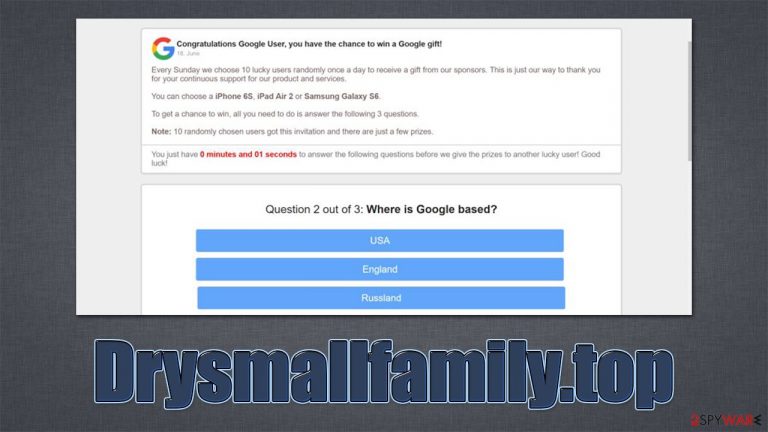Drysmallfamily.top ads (Free Instructions)
Drysmallfamily.top ads Removal Guide
What is Drysmallfamily.top ads?
Drysmallfamily.top is a malicious website that shows fake gift giveaways

Most commonly, users do not venture the websites like Drysmallfamily.top intentionally but are rather redirected to them. The most probable cause of this is the booby-trapped links that one can encounter on various high-risk websites, including torrents, software cracks, illegal video streaming, and similar. Alternatively, redirects to phishing,[1] spoofing, and similar malicious websites could be caused by adware infection, which could be running in the background without users knowing anything about it.
Drysmallfamily.top is a genuinely untrustworthy website that can display all sorts of scams to visitors. It shows misleading or fake messages in order to trick users into performing actions they otherwise wouldn't – there are plenty of similar scam websites that distribute these messages. Regnation.ru, Fastdownloadfile.com, or Wsawani.com are just a few such websites that we have previously discussed.
There could be many different scam messages that the site might accommodate. For example, a prompt that claims that users have been selected for an expensive free gift to receive, and all they have to do is to choose one of the boxes to be assigned a seemingly random item. It is then revealed that they need to enter their home address, email, or even credit card details in order to receive the gift.
Ultimately, the main goal of the Drysmallfamily.top scam authors is to harvest personal user information that could later be used for other scam campaigns or could be sold on the underground forums for profits. Data such as credit card details are extremely valuable and can be used in many malicious ways.
Thus, you should never interact with the contents of the site, as you might end up putting your privacy at risk, enrolling in a fake subscription service, and installing potentially unwanted or malicious software on your device.
| Name | Drysmallfamily.top |
|---|---|
| Type | Scam, adware, redirect |
| Distribution | Software bundles, redirects, ads |
| Symptoms | Redirects to suspicious websites that accommodate commercial or scam content; fake messages offer to download malicious software; ads plague every visited website; unknown extension or program installed on the system |
| Danger | Crooks attempt to make people provide their personal information, download potentially malicious software, or make them subscribe to useless services |
| removal | You should not interact with the contents shown by a scam website and instead, check your system for adware or malware infections with SpyHunter 5Combo Cleaner anti-malware |
| Additional tips | To stop data tracking by third parties via cookies and other tracking technologies, you should clean your browsers and repair damaged system files with FortectIntego. Also, if you provided passwords, change them on all your accounts |
Malicious ads are not that rare
There are millions of websites for people to explore while browsing the web – most of those that are found in Google search results are generally secure. However, the web of links can lead users to all sorts of places, hence one can't dismiss the possibility of that happening at any time.
The probability also increases for those who are spending more time online, as well as those who opt to visit high-risk websites. As we already mentioned, Drysmallfamily.top can host a variety of scams – they are usually portrayed as some type of giveaways of free gifts.
The following “You've made the 9.68-billionth search!” scam is relatively common. In the fake message, crooks pretend to represent Google and try to lure users with what seems to be a stroke of luck by being “selected” to receive a gift:
You've made the 9.68-billionth search!
Congratulations! You are the lucky winner!
Every 10 millionth search is reached worldwide, we will proclaim a winner to send out a thank-you gift.
Please select your lucky prize below and claim it by following the instruction.
Evidently, crooks rely on gullible users who would believe that Google seemingly has chosen them for this seemingly amazing opportunity. Do not believe these types of messages, as no company would randomly give out presents for users for no reason (especially on the internet).

If you are in doubt whether the page is secure, simply check its URL and a lot of things will become clear straight away. For example, Google would not use Drysmallfamily.top web address for any of its promotions. Likewise, remember that logos, text formatting, fonts, and similar attributes can be easily faked.
How to deal with it
The resolution of the Drysmallfamily.top scam encounter drastically depends on actions that you took while visiting it (although it is true that adware already installed on the system might be present prior to the access of the malicious page).
If you have provided one of your passwords on this or a similar site, change it immediately and never again reuse passwords – it's considered to be one of the biggest privacy hazards on the internet.[2]
If you have downloaded and installed any software from this site, you should immediately proceed with the removal steps we provide below. Also, these steps can be useful when adware infection is suspected, as those often affected encounter scams online.
Get rid of unwanted and malicious programs
There are thousands upon thousands of potentially unwanted applications and malware programs created and employed by cybercriminals or unfair individuals all the time. Thus, there are many different apps that could be affecting one's PC, the scope and impact of the infection can also vary greatly.
Before you start with the steps below, we strongly recommend using SpyHunter 5Combo Cleaner, Malwarebytes, or other powerful security software in order to ensure that all the most dangerous and malicious infections are found and removed automatically. Some PUPs, such as browser hijackers, might not be always detected by the security software; hence we also recommend performing the steps below to ensure that the system is fully secure.
Windows
- Enter Control Panel into Windows search box and hit Enter or click on the search result.
- Under Programs, select Uninstall a program.

- From the list, find the entry of the suspicious program.
- Right-click on the application and select Uninstall.
- If User Account Control shows up, click Yes.
- Wait till the uninstallation process is complete and click OK.

Mac
- From the menu bar, select Go > Applications.
- In the Applications folder, look for all related entries.
- Click on the app and drag it to Trash (or right-click and pick Move to Trash)

To fully remove an unwanted app, you need to access Application Support, LaunchAgents, and LaunchDaemons folders and delete relevant files:
- Select Go > Go to Folder.
- Enter /Library/Application Support and click Go or press Enter.
- In the Application Support folder, look for any dubious entries and then delete them.
- Now enter /Library/LaunchAgents and /Library/LaunchDaemons folders the same way and terminate all the related .plist files.

Clean your browsers
Potentially unwanted applications that cause the annoying redirects are commonly installed as browser extensions. In some cases, they might not engage in bad activity for a very long time until they do. Thus, we recommend removing all the apps and enabling them one by one to see whether suspicious activity continues.
Below we also provide instructions on how to properly clean web browser caches in order to prevent data tracking from third parties. Cookies[3] and other trackers can be left by potentially unwanted programs for a long time, even after they are removed. The easiest way to clean web browsers and repair system damage if such has occurred is by using the FortectIntego repair and maintenance tool, although manual steps are also available below.
Google Chrome
- Open Google Chrome, click on the Menu (three vertical dots at the top-right corner) and select More tools > Extensions.
- In the newly opened window, you will see all the installed extensions. Uninstall all the suspicious plugins that might be related to the unwanted program by clicking Remove.

Clean web data on Chrome:
- Click on Menu and pick Settings.
- Under Privacy and security, select Clear browsing data.
- Select Browsing history, Cookies and other site data, as well as Cached images and files.
- Click Clear data.

Mozilla Firefox
- Open Mozilla Firefox browser and click on the Menu (three horizontal lines at the top-right of the window).
- Select Add-ons.
- In here, select the unwanted plugin and click Remove.

Clean web data on Firefox:
- Click Menu and pick Options.
- Go to Privacy & Security section.
- Scroll down to locate Cookies and Site Data.
- Click on Clear Data…
- Select Cookies and Site Data, as well as Cached Web Content and press Clear.

MS Edge (Chromium)
- Open Edge and click select Settings > Extensions.
- Delete unwanted extensions by clicking Remove.

Clean web data on MS Edge:
- Click on Menu and go to Settings.
- Select Privacy and services.
- Under Clear browsing data, pick Choose what to clear.
- Under Time range, pick All time.
- Select Clear now.
Safari
- Click Safari > Preferences…
- In the new window, pick Extensions.
- Select the unwanted extension and select Uninstall.

Clean Safari:
- Click Safari > Clear History…
- From the drop-down menu under Clear, pick all history.
- Confirm with Clear History.

How to prevent from getting adware
Choose a proper web browser and improve your safety with a VPN tool
Online spying has got momentum in recent years and people are getting more and more interested in how to protect their privacy online. One of the basic means to add a layer of security – choose the most private and secure web browser. Although web browsers can't grant full privacy protection and security, some of them are much better at sandboxing, HTTPS upgrading, active content blocking, tracking blocking, phishing protection, and similar privacy-oriented features. However, if you want true anonymity, we suggest you employ a powerful Private Internet Access VPN – it can encrypt all the traffic that comes and goes out of your computer, preventing tracking completely.
Lost your files? Use data recovery software
While some files located on any computer are replaceable or useless, others can be extremely valuable. Family photos, work documents, school projects – these are types of files that we don't want to lose. Unfortunately, there are many ways how unexpected data loss can occur: power cuts, Blue Screen of Death errors, hardware failures, crypto-malware attack, or even accidental deletion.
To ensure that all the files remain intact, you should prepare regular data backups. You can choose cloud-based or physical copies you could restore from later in case of a disaster. If your backups were lost as well or you never bothered to prepare any, Data Recovery Pro can be your only hope to retrieve your invaluable files.
- ^ Cookies and Web Beacons. NTT. NTT Communications.
- ^ Amer Owaida. People know reusing passwords is risky – then do it anyway. WeLiveSecurity. ESET security blog.
- ^ What are cookies? | Cookies definition. Cloudflare. The Web Performance & Security Company.
